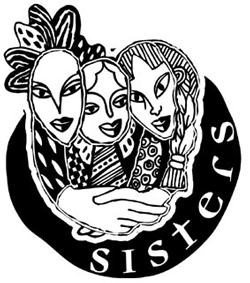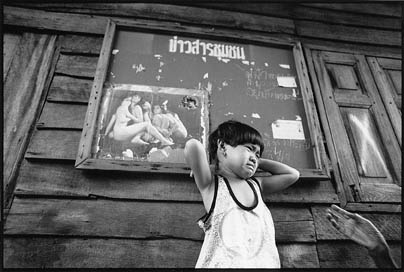
Deconstructing Racism in Sex Trafficking and the Global Sex Trade
By Maitet Ledesma

 |
This section is dedicated to news from the SISTERS network (Sisters in the Struggle to Eliminate Racism and Sexism). This network enables women to link up and exchange their experiences, generating solidarity, supporting one another through concrete actions. Its members come from churches as well as from groups and movements in civil society committed to eliminate racism and sexism.
Deconstructing Racism in Sex Trafficking and the Global Sex Trade |
In Germany in 1980, the first visa restrictions were imposed to prevent further arrivals of asylum-seekers. Spain meanwhile, has fortified its frontiers with North Africa with barbed wire, closed-circuit TV monitoring and a marine guard to patrol all of the country’s 240-plus harbours. It has also entered bilateral agreements with France to control the illegal entry of Turks and Africans. These policies have summarily taken away the rights of non-EC migrant peoples, thus establishing their status as second-class citizens who do not have equal rights with nationals. As a result, they have become even more vulnerable to acts of racism and discrimination, many of which are violent.
Meanwhile, back in the countries of origin, the social, economic and political conditions breeding the out-migration of peoples especially from poor and developing countries churns out a constant oversupply of cheap raw materials, skilled and semi-skilled unemployed workers, and poor women and children who are left to look for ways and means of augmenting the incomes of their families. The ravaging effects of economic globalisation schemes under such euphemisms as tourism development, surplus labour export, alternative employment, the hospitality and entertainment industry, have taken a destructive toll on the lives of poor people, especially among the most vulnerable - the women and children.
Marketing Exoticism and Docility
Today, images of the Philippines being brought to our living rooms in Europe depict a country reeling from overwhelming poverty, with over 70% of the population living below the poverty threshold. The number of unemployed and underemployed Filipinos has reached 10.07 million. The country is unable to cope with the ravages wrought by one natural calamity after another as a result of massive environmental destruction; its wealth and natural resources have been plundered by foreign multinational corporations, greedy local businessmen and corrupt government officials - leaving the land and the people bleeding and dying.
At the same time, the stereotypes of Filipina women in Europe are images of quiet, docile and submissive women who easily blend into the background of wallpapers and rugs as they clean houses or make up hotel beds. Images of beautiful young women walking arm-in-arm with their big-bellied and balding husbands. Images of articulate, well-educated and intelligent young women who have become surrogate mothers in European homes, working in low-paid, unskilled and menial jobs not commensurate to their level of experience, education and skill.
Philippine research statistics confirm that six to eight out of every ten Filipino overseas workers are women. The first most likely job for a Filipina going abroad is as a domestic worker. The second is in the sex trade, selling women for sex on over 200, 000 web-sites, via sex phone calls, to escort services. The trade also sells "exotic and docile" Filipinas into marriage from catalogues with numbered mug-shots, presenting them as the old-fashioned and perfect home-makers who will cater to their husbands’ every whim and fancy. It engages in sex trafficking which involves the systematic and organised transport of women and children for the purpose of sex for profit. In most cases, it uses force, violence, harassment and deceit to entice women and children to enter the sex trade.
Not surprisingly, therefore, total strangers have accosted Filipinas on the streets with questions like, ‘How much did your husband pay for you?’ When Filipinas attend social gatherings and meet people for the first time, they are immediately asked if they are domestic helpers or if they are married to a European. Many are being asked to facilitate introductions to other Filipinas interested in finding Caucasian partners or husbands.
Whether engaged in domestic work or in the sex trade, these women have become the principal breadwinners whose major responsibility it is to ensure the economic survival of their families back home.
The Structural Racism of Economic Globalisation Schemes
According to the research by the Women’s Education Development Productivity Research Organisation (WEDPRO), the victims of sex trafficking are usually women and children from poor families in rural and urban areas, with little or no education and with limited skills and knowledge. Ninety percent of the victims of the global sex trade come from poor countries like the Philippines. Why poor women and children? And why are the majority of them coming from third-world Countries like the Philippines?
While European media have effectively stereotyped Filipinos as domestic workers, "mail-order brides", prostitutes and entertainers, it has stopped short of exposing the root causes of these problems. There has never been any serious effort to educate Western societies in understanding the global and structural framework of the problem. Neither has there been any effort to expose and link the role and impact of economic globalisation schemes in laying down the foundations for the economic and sexual exploitation of women and children.
In the globalising scheme of things, third-world countries and their peoples are relegated to the role of providing for the basic needs of industrialised countries in the West in their march towards unprecedented technological advancement and industrial progress as a source of cheap raw materials, a limitless supply of a cheap and docile labour force for service and to provide for the recreation needs of its population, and a market for its expensive finished industrial products. Economic policies which principally cater to the interests of multinational corporations and which kill local business that can never "freely" compete with the limitless capital and advanced technology of highly industrialised countries; terminally corrupt government officials who wantonly steal from the national coffers and sell the patrimony and sovereignty of the country through such treacherous policies as the Visiting Forces Agreement (which allows the use of over 20 ports all over the Philippines for the rest and recreation needs of visiting military forces) - these have left the country essentially agricultural, non-industrialising, backward and underdeveloped.
These economic policies are among the many conditionalities imposed by international financing institutions like the IMF-WB, GATT / WTO on debtor countries from the third-world like the Philippines. Likewise, they offer the following solutions to the spiraling economic crisis in these countries:

And the problem is escalating, not only in the Philippines but in many other third-world countries. Japan for example, is considered Asia’s largest sex market with an estimated 150,000 entertainers and commercial sex workers coming not only from the Philippines but also from Thailand, Korea and other neighbouring poor Asian countries. Bangladesh, with 400 Bangladeshi women being trafficked into Pakistan every month. Or at least a dozen international criminal syndicates operating in Australia which annually traffick around 300 Thai women into the country for prostitution.
Sex trafficking is as vicious as ever in its pursuit of profit from the commodification and selling of women’s bodies, bought and sold within the global market economy. In the process, it perpetuates and legitimises the continued subjugation, oppression and exploitation of women from a certain class, especially women of a particular race, colour, and economic need.
The problem of sex trafficking is global, and very personal in its impact on all our lives. It is life threatening, it has far-reaching implications to our well-being, the well-being of our families, relatives and friends, and it compromises the very future of the next generations. When confronted with such a situation, it is no longer safe or convenient for us to remain paralysed by our anger or by the magnitude of the problem. Rather, let us use the passion of our anger to confront the problem with courage and conviction.
The Purple Rose Campaign
The Purple Rose Campaign, launched in 1999 by GABRIELA-Philippines, a national alliance of over 250 women’s organisations, programmes, desks and institutions, is an avenue to creatively and positively express the Filipino people’s moral outrage against the escalating problem of sex trafficking of Filipino women and children. The campaign is going on in Belgium, Canada, Germany, Hongkong, Italy, Luxembourg, the Philippines, the Netherlands, Switzerland and the United States.
The Purple Rose Campaign is an organised and global effort to bring together individuals and organisations in the Philippines and in other countries to work together in opposing and protesting the intensifying global sex trade in general, and the sex trafficking of Filipino women and children in particular. It provides all of us with the possibility to regain our lost self-esteem and to create a new image of ourselves, as women, as a people, as human beings; to be known for our spirit of resistance against all forms of injustice and exploitation and for our courage and daring in taking a stand for that which is empowering and genuinely liberating to women and to so-ciety.
Join the Purple Rose Campaign! Wear the purple rose pin as a sign of your resistance and protest against sex trafficking. Sign the pledge card as a sign of your commitment to support the campaign. Popularise the campaign in your communities. Organise groups in your local areas to discuss the issue, how it affects your community and how you can support and participate in the campaign.
EVERYONE HAS A CONTRIBUTION TO MAKE.
EVERYONE CAN MAKE A DIFFERENCE!
European Purple Rose Campaign
Postbus 15687
1001 ND Amsterdam
The Netherlandsbr> E-mail
Tel: (020) 616.5288
Fax: (020) 689.8857